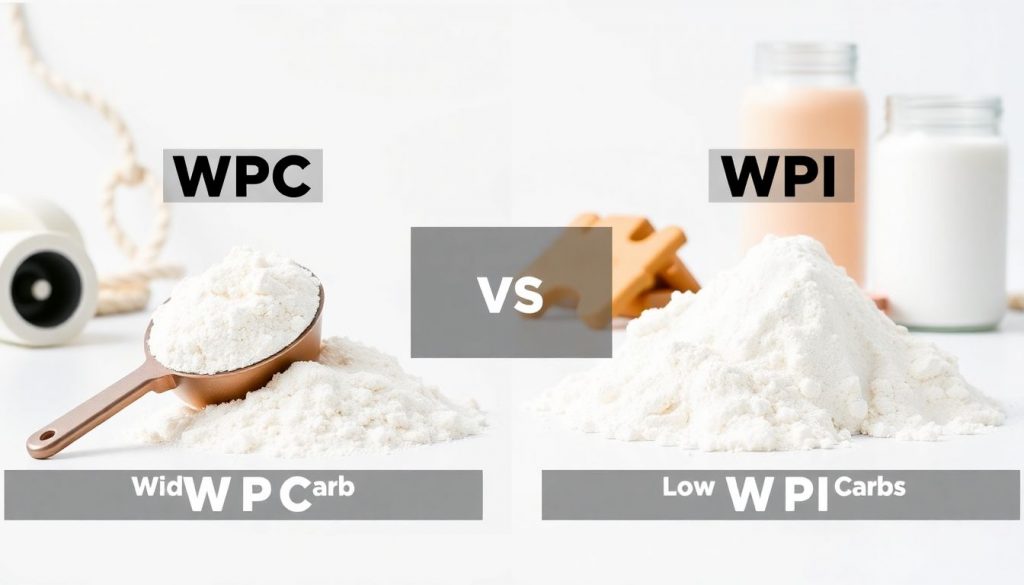Whey protein: differences between WPC and WPI

Whey has become a very popular protein source, especially among athletes and people looking to improve their muscle structure and enhance their performance. However, when looking for a whey protein supplement, the question often arises: should I choose WPC or WPI? Although they both originate from whey, they have key differences that determine their use and benefits. In this article, we’ll break down everything you need to know about WPC (Whey Protein Concentrate) and WPI (Whey Protein Isolate).
What is whey protein?
Whey protein is a by-product of the cheese making process. During this procedure, the liquid whey remaining after milk coagulation is filtered and dried, turning it into a powder rich in high-quality protein. This type of protein stands out for its rapid absorption and its complete profile of essential amino acids, especially BCAAs (branched-chain amino acids), which are key for muscle recovery.
Whey protein supplements are available in several forms, the most common being WPC and WPI, which differ mainly in the manufacturing process, protein concentration and their fat and carbohydrate content.
What is WPC (Whey Protein Concentrate)?
WPC (Whey Protein Concentrate) is the most basic and least processed form of whey. After initial filtration, WPC contains 70% to 80% protein, depending on the brand and quality of the product. The remainder of its composition includes small amounts of fats, lactose (natural milk sugar) and carbohydrates.

Main characteristics of WPC
- Higher nutrient content: Due to its lower degree of processing, it retains beneficial compounds such as lactoglobulins and lactoferrins, which contribute to immune health.
- More affordable: Compared to WPI, WPC is often less expensive, making it an ideal choice for those looking for an affordable protein source.
- Less suitable for lactose intolerant: It contains a higher amount of lactose, which could be a drawback for people with lactose sensitivity.
WPC is an excellent choice for those looking for a complete protein and do not have lactose issues.
What is WPI (Whey Protein Isolate)?
WPI (Whey Protein Isolate) goes through an additional filtration process, called ultrafiltration, which removes virtually all lactose, fats and carbohydrates. This results in a purer protein, with a protein content reaching 90% or more.
Main characteristics of WPI
- Higher purity: Its high protein content and low fat and carbohydrate content make it an ideal choice for those seeking to optimize their protein intake.
- Ideal for lactose intolerant people: By eliminating almost all lactose, it is a safe alternative for people with lactose intolerance.
- More expensive: Its more complex manufacturing process translates into a higher price.
WPI is ideal for those looking for a quick-to-digest protein, especially in contexts such as post-workout, when the body needs nutrients quickly.
WPC vs. WPI: main differences
Although both types of whey protein share benefits such as rapid absorption and high content of essential amino acids, there are clear differences that determine which is more suitable for your needs:
- Protein concentration:
- WPC: 70%-80%.
- WPI: 90% or more.
- Fat and carbohydrate content:
- WPC: Contains more lactose, fats and carbohydrates.
- WPI: Very low in fats and carbohydrates.
- Digestion:
- WPC: May be more difficult to digest for lactose-sensitive people.
- WPI: Easier to digest due to its purity.
- Price:
- WPC: More economical.
- WPI: More expensive due to additional filtration process.
- Target user:
- WPC: Recommended for those looking for a balanced and economical option.
- WPI: Ideal for high performance athletes and lactose intolerant people.
Which one should you choose?
The choice between WPC and WPI depends on your personal needs. If you have no problems with lactose and are looking for a good quality protein at a lower price, WPC will be sufficient. However, if you need a purer protein, with less carbohydrates and fats, or you have lactose sensitivity, WPI is the better choice.
Frequently asked questions on whey protein
Is it better to take WPC or WPI if I do casual exercise?
If you train casually and do not need to control your diet to the millimeter, WPC is an excellent choice. It is more affordable and meets your protein needs.
Is WPI suitable for vegans?
No, both products come from whey, so they are not suitable for vegans but they are suitable for vegetarians. Vegetable proteins such as pea or soy would be alternatives for people with a strict vegan diet, although they are not as efficient as whey proteins.
Is WPC more fattening than WPI?
WPC contains more fat and carbohydrates, but the caloric difference is usually minimal. Whether or not you gain weight will depend on your total caloric intake for the day.
Can I combine WPC and WPI?
Yes, you can combine both proteins if you want to take advantage of the benefits of each. For example, use WPC during the day and WPI after training.
What if I am lactose intolerant and take WPC?
You may experience digestive discomfort such as bloating or gas. In this case, it is better to opt for a WPI or look for lactose-free proteins.
